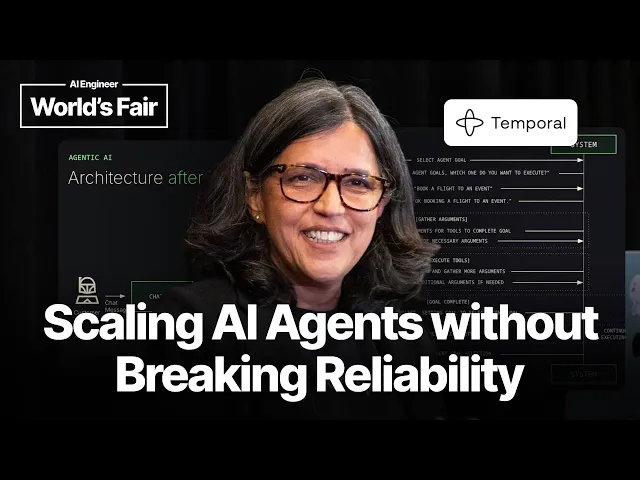Scaling AI Agents Without Breaking Reliability

Reliable AI agent infrastructure demands Temporal's edge
In the rapidly evolving landscape of AI agents, reliability at scale remains the most persistent challenge for enterprises seeking to productize their innovations. Preeti Somal, Head of Engineering at Temporal Technologies, recently outlined how their distributed systems platform addresses this fundamental problem. Her presentation illuminates the critical infrastructure requirements that separate experimental AI prototypes from production-ready, enterprise-grade solutions.
Key Points
- AI agent architecture demands durability, reliability, and scalability beyond what conventional infrastructure can provide, especially as systems grow more complex with multi-agent workflows
- Temporal's distributed systems platform enables "resumability" — allowing long-running processes to continue from where they left off despite failures, a critical capability for AI agents
- The platform's approach handles essential production concerns including observability, versioning, testing, and the management of LLM rate limits that typical application frameworks weren't designed to address
The Infrastructure Gap in AI Agent Development
The most compelling insight from Somal's presentation is that the infrastructure requirements for AI agents fundamentally differ from traditional application patterns. While developers have grown comfortable with stateless microservices, AI agents introduce stateful, long-running workflows that existing infrastructure wasn't designed to support. Temporal's platform addresses this infrastructure gap by providing "resumability" — the ability for processes to continue exactly where they left off after interruptions.
This matters tremendously in the context of enterprise AI adoption. According to a recent McKinsey survey, 65% of organizations attempting to deploy AI projects cite infrastructure limitations as a primary barrier to production rollout. The ability to create reliable, stateful AI agent systems without custom-building distributed systems infrastructure could accelerate enterprise AI adoption by months or even years.
The Hidden Complexity of Production AI Systems
What Somal's presentation doesn't fully explore is the exponential complexity increase when moving from single-agent to multi-agent systems. In practice, organizations like Goldman Sachs have discovered that implementing cooperative AI agents requires solving not just reliability challenges but also complex orchestration problems. Their experimental "AI analyst" system coordinates multiple specialized agents that perform research, analysis, and report generation — but early versions failed frequently during handoffs between agents.
This multi-agent complexity creates another layer of infrastructure requirements beyond what Somal discussed. Organizations need not just reliability for individual agents but sophisticated coordination mechanisms
Recent Videos
How To Earn MONEY With Images (No Bullsh*t)
Smart earnings from your image collection In today's digital economy, passive income streams have become increasingly accessible to creators with various skill sets. A recent YouTube video cuts through the hype to explore legitimate ways photographers, designers, and even casual smartphone users can monetize their image collections. The strategies outlined don't rely on unrealistic promises or complicated schemes—instead, they focus on established marketplaces with proven revenue potential for image creators. Key Points Stock photography platforms like Shutterstock, Adobe Stock, and Getty Images remain viable income sources when you understand their specific requirements and optimize your submissions accordingly. Specialized marketplaces focusing...
Oct 3, 2025New SHAPE SHIFTING AI Robot Is Freaking People Out
Liquid robots will change everything In the quiet labs of Carnegie Mellon University, scientists have created something that feels plucked from science fiction—a magnetic slime robot that can transform between liquid and solid states, slipping through tight spaces before reassembling on the other side. This technology, showcased in a recent YouTube video, represents a significant leap beyond traditional robotics into a realm where machines mimic not just animal movements, but their fundamental physical properties. While the internet might be buzzing with dystopian concerns about "shape-shifting terminators," the reality offers far more promising applications that could revolutionize medicine, rescue operations, and...
Oct 3, 2025How To Do Homeless AI Tiktok Trend (Tiktok Homeless AI Tutorial)
AI homeless trend raises ethical concerns In an era where social media trends evolve faster than we can comprehend them, TikTok's "homeless AI" trend has sparked both creative engagement and serious ethical questions. The trend, which involves using AI to transform ordinary photos into images depicting homelessness, has rapidly gained traction across the platform, with creators eagerly jumping on board to showcase their digital transformations. While the technical process is relatively straightforward, the implications of digitally "becoming homeless" for entertainment deserve careful consideration. The video tutorial provides a step-by-step guide on creating these AI-generated images, explaining how users can transform...
